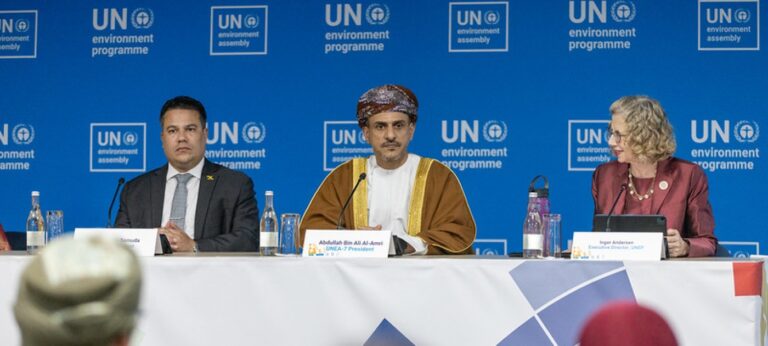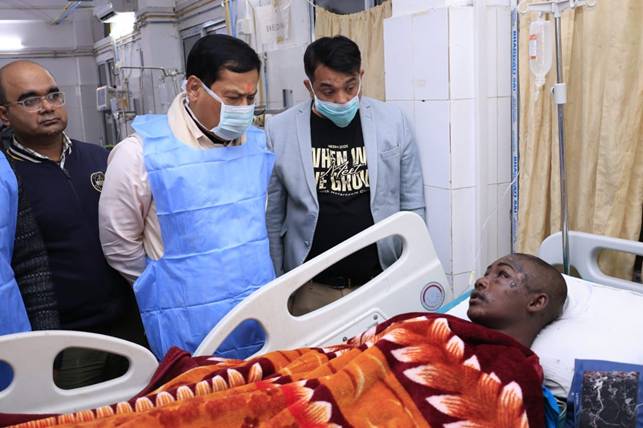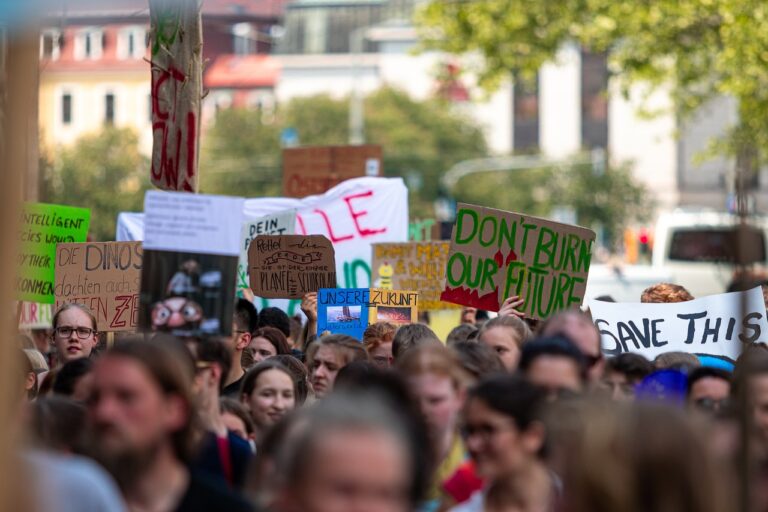
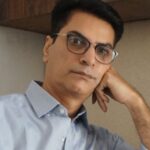 By Ranjit Monga*
By Ranjit Monga*
Building communities, and living our lives sustainably are the most important lessons of the COVID-19 pandemic
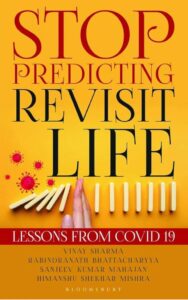 The biggest lesson from the COVID-19 pandemic is that let us focus on living our lives, in association with each other in communities, watching each other’s back, holding each other’s hand, and making each other happy, according to Professor Vinay Sharma, co-author of the book ‘Stop Predicting: Revisit Life Lessons from Covid-19’.
The biggest lesson from the COVID-19 pandemic is that let us focus on living our lives, in association with each other in communities, watching each other’s back, holding each other’s hand, and making each other happy, according to Professor Vinay Sharma, co-author of the book ‘Stop Predicting: Revisit Life Lessons from Covid-19’.
“These lessons have been taught to us since our childhood. And we always talk about them, but are we practising them? Have we learned them?” he questions while discussing the book, which documents the entire chronology of the spread of the deadly virus from 2020 up to 2021 and the steps taken by the government and various authorities in handling the different situations that arose during the pandemic.
Lest we forget, the COVID-19 pandemic which seems like a distant memory now, gave rise to frightening consequences and events that affected every individual across the world and which no one could predict.
“That is why the title ‘Stop Predicting’, the world was seeing such unprecedented devastation that no one, I repeat no one had predicted. No scientific, social, or economic model that we had been following all these years came to our rescue. Whether it was about the trajectory of the virus, the way it would mutate, how it will affect ordinary people, what emergency measures to put in place,” informs Prof. Sharma.

Vinay Sharma is a professor at the Indian Institute of Technology Roorkee’s Department of Management Studies, where he has been since 2008. He has also been a joint professor in the Department of Design at the same institution. He has authored many research papers on different socioeconomic aspects, spirituality, management, rural markets, as well as ecology, and the environment.
The book has been co-authored by three other persons Dr. Rabindranath Bhattacharyya, professor of Political Science at the University of Burdwan, Sanjeev Kumar Mahajan, professor of public administration at Himachal Pradesh University, Shimla and Himanshu Shekhar Mishra, senior editor with NDTV. The book has perspectives from all these authors relating to their field of specialization.
“All the authors used to discuss the issue of its unpredictability, and none had an explanation for what was happening,” he adds.
According to Prof. Sharma, the authors identified the strengths as well as the vulnerabilities of the human race which came to the fore during the pandemic. “If we compare the virus to an enemy, the enemy it seemed had been watching us for a long time and made us realize where we stand, how we have entered a never-ending race of growth, which is good for the economy, but it showed us how that had done so much damage to our society, our communities, and structures, the kind of pollution situation we are facing, our medical infrastructure, policy structure and even saw how we would or would not support each other during the time of crisis”, he points out.
“It froze us, we were frightened, and the book traces our journey how everyone passed this phase, how we lost account of time and stopped thinking about what we would do in the future. It even changed our vocabulary. The word ‘positive’ lost its connotation and became a frightening word. ‘Lockdown’ and ‘mass containment’, these were unheard of words which everyone got acquainted with suddenly,” he adds.
“The pandemic also made us realize that the human race is very resilient and has a lot of strength and that if we keep these intact, we can come out of the crisis,” asserts Prof. Sharma.
“Professor Mahajan talked about Indian federalism because all the decisions had to be taken between the central government and the state governments and he discusses how it panned out. I pitched in with the perspective of leadership. I realized that leadership at all levels was being exemplified even in such a serious situation. Even in my institution, the leadership was focusing on how to continue classes and labs virtually. And eventually, we worked it out. The scientists, the police, the defence forces, health authorities, everyone was doing their duty,” he states and adds that Himanshu Shekhar pointed out the importance of disaster communication, as well as the significant role agriculture and food security played in supporting the population.
Elaborating on the larger lessons of the COVID-19 epidemic Prof. Sharma emphasizes that time gives us several lessons, but it never waits for us to absorb them. It is up to us to imbibe those lessons. “I realized during the pandemic that I should have been talking regularly to so many people and said all those things I wanted to say. During one time I just wanted to see my mother when I heard that her health was failing. So, I rushed to Lucknow, where she stays. I drove non-stop for ten hours and reached her residence. I was wearing a mask, but she told me to remove it so she could see my face. It was a very touching moment for me,” he recounts.
“The biggest lesson is that if we think about how we spent the last 15-20 years of our lives, we can recall our professional and personal achievements, but if someone asks how we lived our lives, what would we say? How would we summarize our lives? And that question is very perplexing,” he continues.
“I was talking to a group of CEOs once and I gave them 30 seconds to write five words that summarize their life, and I told them if they wanted to complement those words, they could also write one sentence. It is not that easy and one or two could write a few things. But everyone was puzzled about how to summarize their whole life in just five words. In one sentence. And this lesson I learned from my parents actually, once I asked the same question to my father and mother. My father is a doctor, and my mother, who was also a doctor left this world in 2001. So, my mother said that she performed almost 3,00,000 surgeries without any failure in her life with God’s grace. She saved so many lives, this is her life and she brought up two sons. And then my father said he worked relentlessly to take healthcare to the poor and these many people he could touch upon during his lifetime, working relentlessly, regardless of what personal problems he faced,” recalls Prof. Sharma.
This was a defining moment for the professor in which he realized that several people could define their life in a short sentence and several people will not be able to.
“So that is the perspective, that if you can summarize, this is what I did for others. And if someone summarizes that wherein I am included as a subject that this is what has been done for me, that makes sense. You know, we live for each other, so we should look out for each other,” he adds.
He also talks about several other lessons concerning different domains. “Prof. Mahajan talks about livelihood. With the kind of unpredictability we saw, the lesson is how to ensure sustainable livelihood for everyone. A livelihood within which people feel free and happy. With regard to education, we seem to have converted education as a mode of achieving a profession for linear growth in our lives, strongly associated with salary output. But then you see are we really focusing on what education is meant for? And that is, for contributing to this world meaningfully, for the happiness and betterment of others,” Prof. Sharma stresses.
“Dr. Rabindranath talks about migrant workers and food security. If we can find sustainable livelihoods for people near their place of residence then such situations which the migrant population faced, would not be repeated in the future,” Prof. Sharma adds.
Talking about the impact of environmental pollution, he points out that a valuable and practical lesson was learned during the pandemic. “When everything came to an abrupt stop, the pollution levels went down. There was a time when people started saying that they could see a clear sky, and they could see water in the rivers getting rejuvenated. This was amazing and for years we have been trying to control pollution, and here we were. When everything stopped, the pollution levels also decreased,” he says.
“So, the lesson is that we should reduce whatever is not needed in our lives, whether it is travel, consumption, or anything else. We should revisit everything in our lives with a new perspective. This is an important lesson we learned. If everyone starts doing it would be extremely effective,” he adds.
‘But did we learn the lessons?” Prof. Sharma asks. “As soon as the lockdown began to open, people started to travel again and began to visit tourist places in large numbers. It should not have been the narrative. We have to change the narrative if I am affected to a certain degree, and someone else is affected to a greater degree. I should be sensitive to both degrees equally and all of us should change the narrative and rejuvenate our lives with new learning,” he implores.
“We have to change the growth narrative as well. We can start by revisiting the measurement criteria. If you keep on following the numerical and scale-based kind of growth perspective or let’s say ranking based kind of a growth perspective, richest man, poorest man, richest country, poorest country, then it would be difficult for us to get out of a race and stop and relax and you know, focus on equity as far as the distribution goes. So that is how we have to visit things in a different kind of a manner,” he adds.
Prof. Sharma also suggests a few steps to take to imbibe the lessons of COVID-19. “We must celebrate our Corona warriors. We should have methods and processes to celebrate their sacrifices and contributions. Every child in this country should know the names of important scientists, police officers, defence personnel, ambulance drivers, and hospital staff, and celebrate their contribution and their sacrifices. We should remember them for their strength not let their sacrifices get wasted,” he recommends.
“The second part is we should always be there for each other while forgetting the pain that we have gone through, and we should remember and follow those lessons. And let us focus on building resilience in our communities, looking out for each other while focusing on living our lives. We should make these two three things the vision and mission of our lives, imbibing a new understanding,” he proposes.
Click below to listen to the interview on Spotify Podcasts:
https://spotify.link/g0t5bGYzFDb
Apple Podcasts:
https://podcasts.apple.com/in/podcast/books-and-us/id1688845897?i=1000630394061
*Senior journalist


